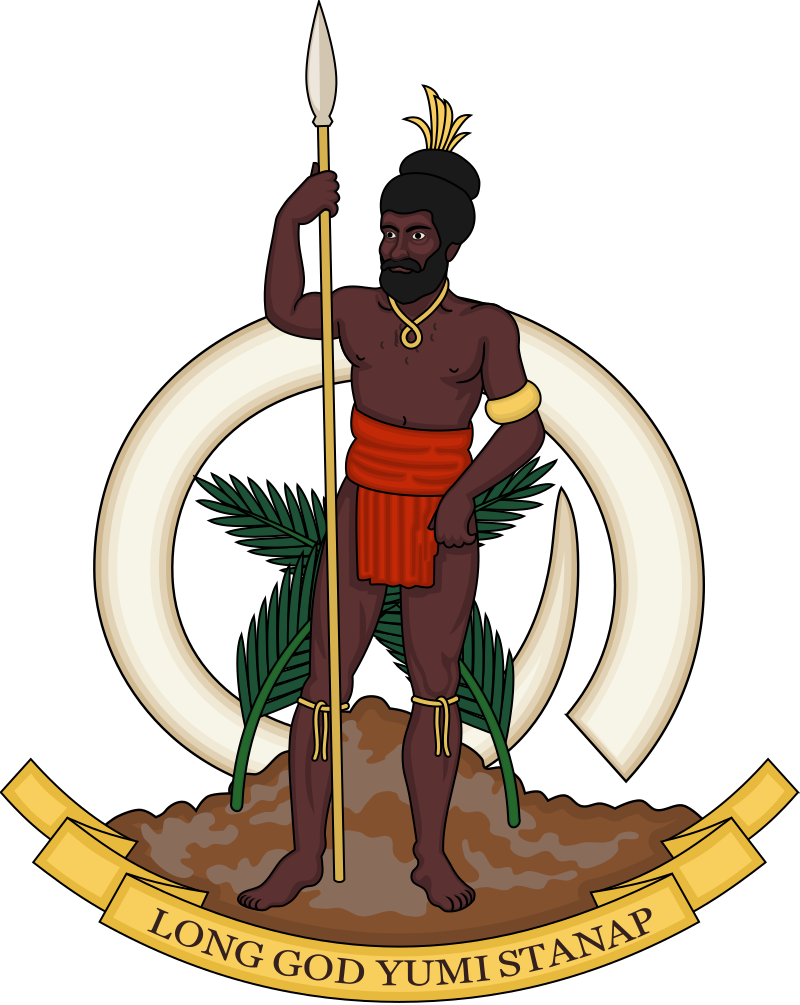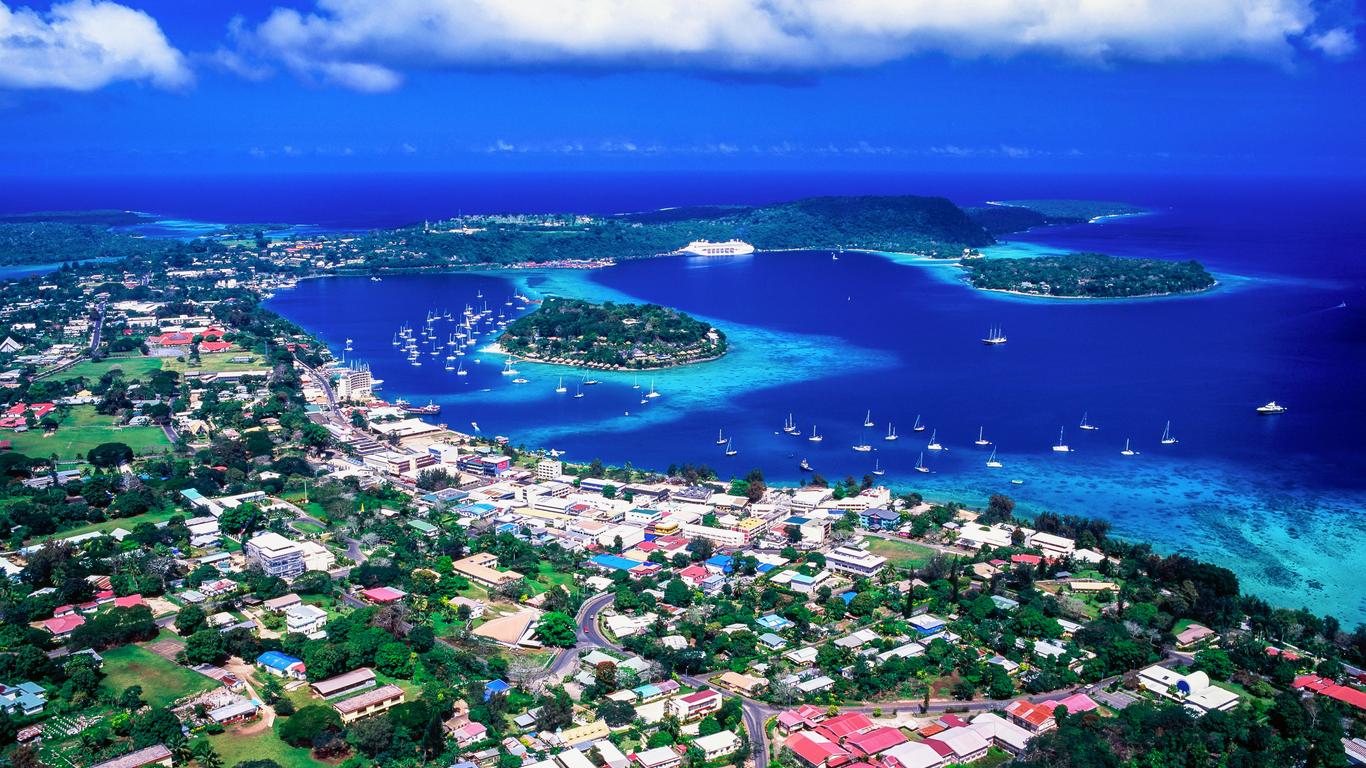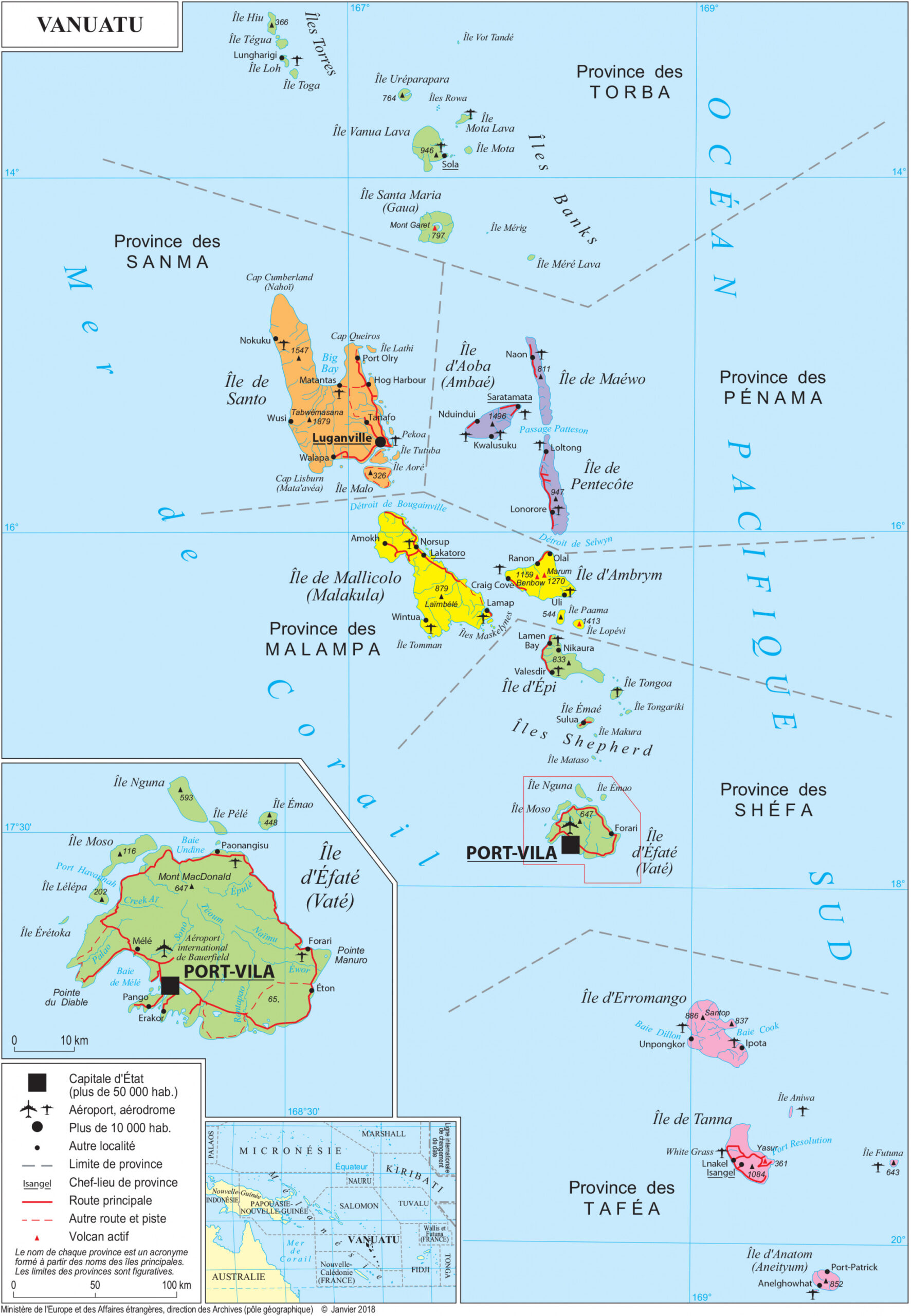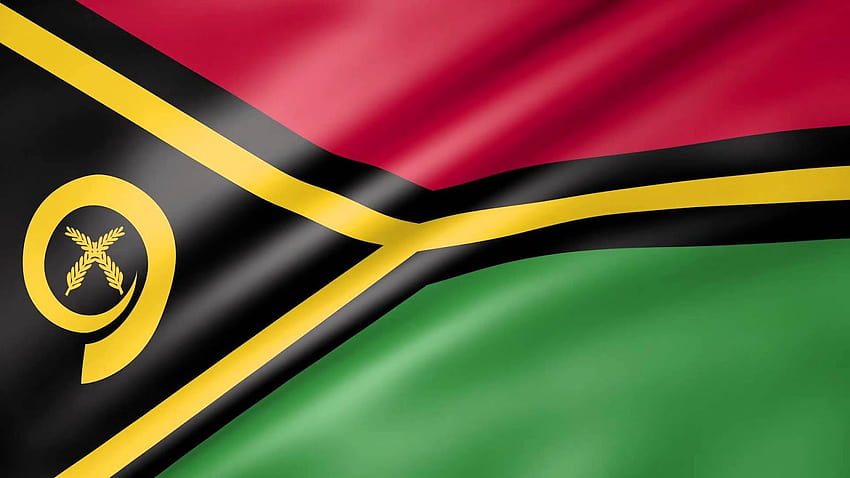- Introduction
- Facts about Vanuatu History
- Facts about Vanuatu Culture
- Facts about Vanuatu Geography
- Facts about Vanuatu Political Situation
- Facts about Vanuatu Economy
- Facts about Vanuatu Society
- Facts about Vanuatu Ethnic Diversity
- Facts about Vanuatu Languages
- Facts about Vanuatu Religion
- Facts about Vanuatu Conflict and War
- Facts about Vanuatu Reconstruction Efforts
- Facts about Vanuatu International Relations
- Facts about Vanuatu Humanitarian Issues
- Facts about Vanuatu Women’s Rights
- Facts about Vanuatu Education
- Facts about Vanuatu Infrastructure
- Facts about Vanuatu Natural Resources
- Facts about Vanuatu Tourism
- Facts about Vanuatu Future Prospects
- Conclusion
- Frequently Asked Questions About Vanuatu
Introduction
Settled in the sky-blue waters of the South Pacific Sea, Vanuatu remains as a demonstration of social lavishness, regular magnificence, and tough networks. This archipelago of 83 islands flaunts an enamoring history, lively culture, and various society formed by hundreds of years of custom and connection. From its provincial past to its present-day political scene, Vanuatu’s process mirrors a mix of Melanesian legacy, European impact, and a mission for freedom. Allow us to dig into the complex features of Vanuatu, investigating its set of experiences, culture, geology, economy, and that’s just the beginning, to acquire a more profound comprehension of this captivating country.
Facts about Vanuatu History
Vanuatu’s set of experiences is an embroidery woven with strings of old Melanesian settlements, European investigation, and the journey for self-assurance. Occupied for centuries, the islands saw the ascent of intricate social orders some time before European contact. It was in the seventeenth century that pioneers from Europe previously set foot on these shores, prompting a time of provincial contention. The islands were at last represented under a joint English French condo until the beginning of freedom in 1980, denoting another part in Vanuatu’s set of experiences under the administration of figures like Walter Lini.
- Vanuatu was first occupied by Melanesian individuals around 2000 BCE, with proof of intricate social orders and horticulture tracing all the way back to around 1300 BCE.
- European investigation of the islands started in the seventeenth 100 years, with English and French competition finishing in joint Old English French maritime watches during the 1880s.
- The islands were together directed as the New Hebrides under an English French pilgrim townhouse from 1906 until freedom in 1980.
- Independence brought another constitution and the foundation of a parliamentary framework, with Walter Lini turning into Vanuatu’s most memorable State head.
- Throughout its set of experiences, Vanuatu has kept areas of strength for a character, with customary practices and ceremonies assuming a critical part in day to day existence.
Facts about Vanuatu Culture
At the core of Vanuatu’s personality lies its dynamic and different culture, where customary practices and customs interlace with present day impacts. From the enthralling area plunging functions of Pentecost to complicated wood carvings portraying tribal spirits, Vanuatu’s social scene is a living demonstration of its kin’s legacy. Kastom, the conventional lifestyle, keeps on assuming a vital part in the public eye, cultivating a feeling of local area and character among its occupants. Guests to the Public Historical center of Vanuatu are blessed to receive a visual banquet of curios that recount the narrative of this novel culture.
- Vanuatu’s way of life is rich with different customs, including elaborate services, remarkable music, and dance structures, for example, the renowned “Nagol” land jumping.
- Kastom, or standard practices, keep on being crucial, affecting everything from social associations to administration.
- The nation is known for its multifaceted wood carvings, which frequently portray profound and tribal themes.
- Storytelling through oral customs stays an energetic piece of Vanuatu’s way of life, passing down history, legends, and information from one age to another.
- The Public Exhibition hall of Vanuatu in Port Vila jelly and grandstands the country’s social curios and legacy.
Facts about Vanuatu Geography
Vanuatu’s topography is however shifted as it seems to be amazing, with volcanic pinnacles, lavish rainforests, and perfect sea shores enhancing its 83 islands. Mount Tabwemasana, standing tall on Espiritu Santo, offers all-encompassing perspectives on this island heaven. The heat and humidity bring particular wet and dry seasons; however, the islands are not without their difficulties, confronting the danger of twisters during specific seasons. However, it is this very disconnection and various scene that have safeguarded Vanuatu’s novel vegetation, making it a shelter for nature darlings.
- Vanuatu is an archipelago situated in the South Pacific Sea, comprising of 83 islands, with volcanic and uneven territory.
- The islands are known for their shocking normal excellence, including lavish rainforests, flawless sea shores, and various marine life.
- Mount Tabwemasana on Espiritu Santo is the most elevated point, arriving at 1,879 meters (6,165 feet) above ocean level.
- The nation encounters a heat and humidity with particular wet and dry seasons, inclined to twisters among November and April.
- Vanuatu’s geological seclusion has added to the conservation of one of a kind widely varied vegetation, including a few endemic animal groups.
Facts about Vanuatu Political Situation
As a youthful country, Vanuatu has explored the waters of a majority rules government since acquiring freedom, with a parliamentary framework and a President as its head of state. Political strength has on occasion confronted tests, yet the country’s obligation to grassroots developments and conventional administration structures has been a wellspring of versatility. The Parliament of Vanuatu, situated in Port Vila, fills in as the administrative center where regulations are created to direct the country forward. Ideological groups frequently structure alliances, mirroring the different interests and portrayal of the different islands and networks.
- Vanuatu works as a parliamentary vote-based system inside the Federation of Countries, with a President as the head of state and a Top state leader as the head of government.
- Political dependability has now and again been tested by changes in administration and periodic statements of disapproval in the public authority.
- The nation has a past filled with grassroots developments and neighborhood boards, keeping a harmony between conventional administration designs and current political frameworks.
- The Parliament of Vanuatu, situated in Port Vila, is the administrative body liable for making regulations and strategies.
- Political gatherings in Vanuatu frequently structure alliances to administer because of the assorted interests and portrayal of various islands and networks.
Facts about Vanuatu Economy
Vanuatu’s economy is a mix of horticulture, the travel industry, and arising areas like seaward monetary administrations. The prolific grounds yield copra, cocoa, and kava, while the travel industry draws guests with commitments of sky blue waters and social encounters. Provokes like restricted foundation and defenselessness to cataclysmic events highlight the requirement for maintainable development. Fishing, both for food and business, stays necessary to the economy, with fish being a valued commodity. In spite of these difficulties, Vanuatu’s creativity and pioneering soul look good for its monetary future.
- Vanuatu’s economy depends vigorously on horticulture, with key products including copra, cocoa, kava, and lumber.
- Tourism is a critical monetary driver, with guests drawn to the country’s regular excellence, plunging spots, and social encounters.
- The nation has likewise fostered a developing seaward monetary administrations area, despite the fact that endeavors have been made to battle tax evasion.
- Fishing, both for resource and business purposes, assumes an imperative part in the economy, with fish being a significant product.
- Challenges like restricted foundation, dependence on imports for products, and weakness to catastrophic events influence Vanuatu’s financial development.
Facts about Vanuatu Society
Vanuatu’s general public is described areas of strength for by ties, regard for seniors, and a young populace anxious to shape its future. Local area bonds run profound, with customary works on encouraging common help and connection organizations. Endeavors to resolve social issues, for example, orientation equity and admittance to medical services are progressing, mirroring a promise to comprehensive turn of events. Elderly folks, respected for their insight, assume fundamental parts in dynamic inside their networks, guaranteeing progression with the past while embracing the chances of the present.
- Vanuatu’s general public is described areas of strength for by ties and connection organizations, with more distant families assuming a focal part in day to day existence.
- Traditional practices, for example, gift-giving and correspondence, add to social attachment and common help inside networks.
- Elders are exceptionally regarded and frequently act as chiefs and consultants inside their networks.
- Vanuatu has a young populace, with a critical rate younger than 25, molding patterns in schooling and business.
- The nation has put forth attempts to resolve social issues like orientation correspondence, admittance to medical services, and destitution mitigation.
Facts about Vanuatu Ethnic Diversity
- Vanuatu is home to north of 110 unmistakable social and phonetic gatherings, each with its own practices, dialects, and customs.
- Melanesian people groups make up most of the populace, with more modest networks of Europeans, Chinese, and other Pacific Islanders.
- The variety of ethnic gatherings adds to Vanuatu’s rich social embroidered artwork, with each gathering keeping up with its novel character and practices.
- Despite this variety, there is areas of strength for an of public solidarity and pride among the different ethnic gatherings.
- Traditional information and practices of every ethnic gathering are many times saved and elapsed down through ages.
Facts about Vanuatu Languages
- Vanuatu is quite possibly of the most semantically different country on the planet, with more than 130 native dialects spoken.
- Bislama, a Creole language in view of English, is the most broadly spoken and fills in as a most widely used language across the islands.
- English and French are the authority dialects, mirroring the country’s pilgrim history and continuous global ties.
- Many people group likewise keep up with their native dialects, which are vital to their social character and legacy.
- Language safeguarding endeavors are progressing, with schools and social establishments advancing the utilization and learning of native dialects.
Facts about Vanuatu Religion
- Vanuatu has a different strict scene, with Christianity being the prevailing confidence, presented by ministers during the provincial time frame.
- Various Christian groups are worked on, including Presbyterian, Anglican, Catholic, Seventh-day Adventist, and others.
- Traditional convictions and practices, frequently alluded to as “Kastom” or “custom,” keep on coinciding with Christianity, mixing in special ways.
- The “freight clique” peculiarity, where a few gatherings have faith in the arrival of genealogical spirits carrying a joyous bounty gifts or “freight,” has been seen in pieces of Vanuatu.
- Freedom of religion is safeguarded by the constitution, and strict celebrations and services assume a huge part in Vanuatu’s social schedule.
Facts about Vanuatu Conflict and War
- Vanuatu has not experienced critical struggle under the surface or battle since acquiring freedom in 1980.
- The country’s set of experiences incorporates times of ancestral fighting and clashes between European powers, however current endeavors focus on harmony and solidarity.
- Vanuatu’s tactical power, the Vanuatu Versatile Power (VMF), is principally centered around catastrophe reaction and keeping up with interior security.
- The country has a strategy of non-arrangement, deciding not to line up with any significant military power coalitions or unions.
- Diplomatic endeavors center around quiet goals to local struggles and advancing Vanuatu as a signal of harmony in the Pacific.

Facts about Vanuatu Reconstruction Efforts
- Vanuatu has confronted huge difficulties from catastrophic events, including typhoons, quakes, and tidal waves, requiring progressing recreation endeavors.
- International guide and backing have been vital in modifying framework, homes, and networks subsequent to destroying occasions.
- The government has carried out projects to upgrade strength to cataclysmic events, including further developed construction laws and early admonition frameworks.
- NGOs and chip in associations play had a crucial impact in post-fiasco recreation and recuperation endeavors.
- Despite these difficulties, Vanuatu’s flexibility and local area soul have been key variables in revamping and pushing ahead.
Facts about Vanuatu International Relations
- Vanuatu keeps up with political relations with a scope of nations, including previous pioneer powers like the UK and France, as well as China, Australia, and New Zealand.
- The nation is a functioning individual from territorial associations like the Pacific Islands Discussion (PIF) and the Melanesian Initiate Gathering (MSG).
- Diplomatic acknowledgment of Taiwan by Vanuatu has been a disputed matter, with shifts in strategy between perceiving Taiwan and China.
- Vanuatu has likewise been engaged with provincial security drives, incorporating joint military activities with accomplice nations.
- The country’s global relations accentuate collaboration on issues, for example, environmental change, feasible turn of events, and social trade.
Facts about Vanuatu Humanitarian Issues
- Vanuatu appearances different philanthropic difficulties, including admittance to clean water and sterilization, particularly in provincial regions.
- The nation has gained ground in further developing medical care administrations, yet there are still variations in access, especially in far off islands.
- Malnutrition remaining parts a worry, particularly among kids, with endeavors zeroed in on further developing sustenance and food security.
- Gender-based savagery is a continuous issue, with missions and projects pointed toward bringing issues to light and offering help administrations.
- Climate change represents a critical helpful danger, with rising ocean levels and outrageous climate occasions influencing vocations and networks.
Facts about Vanuatu Women’s Rights
- Vanuatu has made progress in propelling ladies’ privileges, with drives to build ladies’ political portrayal and positions of authority.
- The Public Board of Ladies assumes a vital part in pushing for orientation fairness and enabling ladies across different areas.
- Despite advancement, difficulties, for example, orientation-based viciousness and conventional orientation jobs endure.
- Maternal medical care administrations have improved, however admittance to family arranging and regenerative wellbeing administrations can in any case be restricted.
- Education is viewed as a pathway to orientation correspondence, with endeavors to advance young ladies’ schooling and decrease orientation variations in schools.
Facts about Vanuatu Education
- Education is free and obligatory for kids between the ages of 6 and 12 in Vanuatu, with essential and auxiliary tutoring gave.
- The nation faces difficulties in giving quality training, especially in distant regions with restricted assets.
- Efforts are in progress to further develop educator preparing and educational program improvement to address the issues of an evolving society.
- Technical and professional instruction programs plan to outfit understudies with down to earth abilities for business potential open doors.
- Traditional information and social practices are coordinated into the school system, underscoring the significance of saving Vanuatu’s legacy.

Facts about Vanuatu Infrastructure
- Vanuatu’s framework fluctuates across islands, with metropolitan regions like Port Vila and Loganville having better offices contrasted with provincial areas.
- Roads and transportation networks are fundamental for interfacing networks, yet many are vulnerable to harm from cataclysmic events.
- The nation has restricted admittance to power, with endeavors to extend sustainable power sources like sun-based power.
- Telecommunications and web access are improving, yet network stays a test in a few distant regions.
- Infrastructure improvement is fundamentally important for the public authority, zeroing in on supportable and tough arrangements.
Facts about Vanuatu Natural Resources
- Vanuatu is wealthy in regular assets, including rural items like copra, cocoa, and kava, which are significant commodities.
- The country’s marine assets, especially fisheries, assume a vital part in the economy and food security.
- Vanuatu’s volcanic soil upholds assorted greenery, including tropical foods grown from the ground.
- Timber is another significant asset, albeit reasonable ranger service rehearses are significant for preservation.
- Mineral assets like manganese, gold, and silver exist, however double-dealing is restricted because of ecological and calculated difficulties.
Facts about Vanuatu Tourism
- Tourism is a critical financial driver for Vanuatu, drawing in guests with its perfect sea shores, coral reefs, and experience exercises.
- Popular exercises for travelers incorporate plunging, swimming, climbing, and social encounters like conventional moves and services.
- The nation offers a scope of convenience choices, from extravagance resorts to eco-accommodating lodges.
- Cruise boat the travel industry is likewise developing, with ports of call at Port Vila and Loganville acquiring guests.
- Community-based the travel industry drives permit explorers to draw in with neighborhood networks, advancing social trade and reasonable practices.
Facts about Vanuatu Future Prospects
- Vanuatu’s future possibilities rely on maintainable turn of events, offsetting monetary development with natural protection.
- Climate change strength is a main concern, with endeavors to adjust to rising ocean levels and outrageous climate occasions.
- Diversifying the economy past horticulture and the travel industry is an objective, with potential in areas like environmentally friendly power and maintainable fisheries.
- Strengthening schooling and medical care frameworks will be pivotal for human resources advancement and working on personal satisfaction.
- International organizations and participation will keep on assuming a crucial part in Vanuatu’s excursion toward a prosperous and versatile future.

Conclusion
All in all, Vanuatu’s story is one of versatility, social lavishness, and normal wonder. From its antiquated roots to its cutting-edge yearnings, this island country keeps on enthralling the world with its different legacy and warm accommodation. As Vanuatu walks into what was to come, directed by the insight of its elderly folks and the dynamism of its childhood, it remains as a brilliant illustration of a country embracing its past while embracing the chances of tomorrow. Whether investigating its set of experiences, drenching oneself in its way of life, or wondering about its topographical miracles, Vanuatu entices all who look for experience, revelation, and a more profound comprehension of the human soul.
also Read 15+ Amazing Facts about Vatican City
Frequently Asked Questions About Vanuatu
What is the historical backdrop of Vanuatu?
Vanuatu’s set of experiences traces all the way back to antiquated Melanesian settlements, trailed by European investigation in the seventeenth 100 years. It was together administered by England and France as the New Hebrides until acquiring freedom in 1980, drove by figures like Walter Lini.
How is Vanuatu’s way of life?
Vanuatu’s way of life is energetic and various, with customs, for example, land jumping functions, unpredictable wood carvings, and the act of kastom (custom) assuming focal parts. Customary music, dance, and narrating are vital pieces of regular daily existence.
Where is Vanuatu found geologically?
Vanuatu is an archipelago situated in the South Pacific Sea, containing 83 islands known for their volcanic pinnacles, rich rainforests, and shocking sea shores. The nation lies east of Australia, upper east of New Caledonia, and west of Fiji.
What is what is happening in Vanuatu?
Vanuatu works as a parliamentary vote based system inside the Province, with a President as the head of state and a State head as the head of government. Political security has seen times of challenge, with the Parliament of Vanuatu in Port Vila as the authoritative body.
What is the economy of Vanuatu in light of?
Vanuatu’s economy depends on agribusiness, the travel industry, and arising areas like seaward monetary administrations. Key commodities incorporate copra, cocoa, kava, and fish. The travel industry, attracted to the country’s normal magnificence and social encounters, is a critical financial driver.
How assorted is the general public of Vanuatu?
Vanuatu’s general public is assorted, with north of 110 social and phonetic gatherings. Melanesian people groups structure the larger part, close by more modest networks of Europeans, Chinese, and other Pacific Islanders. Local area ties, regard for seniors, and customary practices are major parts of Vanuatu’s general public.
What dialects are spoken in Vanuatu?
Vanuatu is one of the most phonetically assorted nations around the world, with more than 130 native dialects. Bislama, a Creole language in view of English, is the most generally spoken and fills in as a most widely used language. English and French are the authority dialects.
What is the dominating religion in Vanuatu?
Christianity is the predominant religion in Vanuatu, presented by evangelists during the frontier time frame. Different groups, including Presbyterian, Anglican, Catholic, and Seventh-day Adventist, are drilled. Conventional convictions and practices, known as “Kastom,” additionally exist together with Christianity.
Has Vanuatu experienced struggle or war?
Since acquiring freedom in 1980, Vanuatu has not experienced critical struggle under the surface or war. The nation focuses on harmony and solidarity, with a strategy of non-arrangement and a tactical power zeroed in on calamity reaction and inward security.
How does Vanuatu recuperate from cataclysmic events?
Vanuatu faces difficulties from cataclysmic events like typhoons, seismic tremors, and tidal waves. Global guide and backing are urgent for reproduction endeavors, close by taxpayer supported initiatives to upgrade versatility. NGOs and volunteer associations assume imperative parts in post-calamity recuperation endeavors.
for more information visit Wikipedia.org
